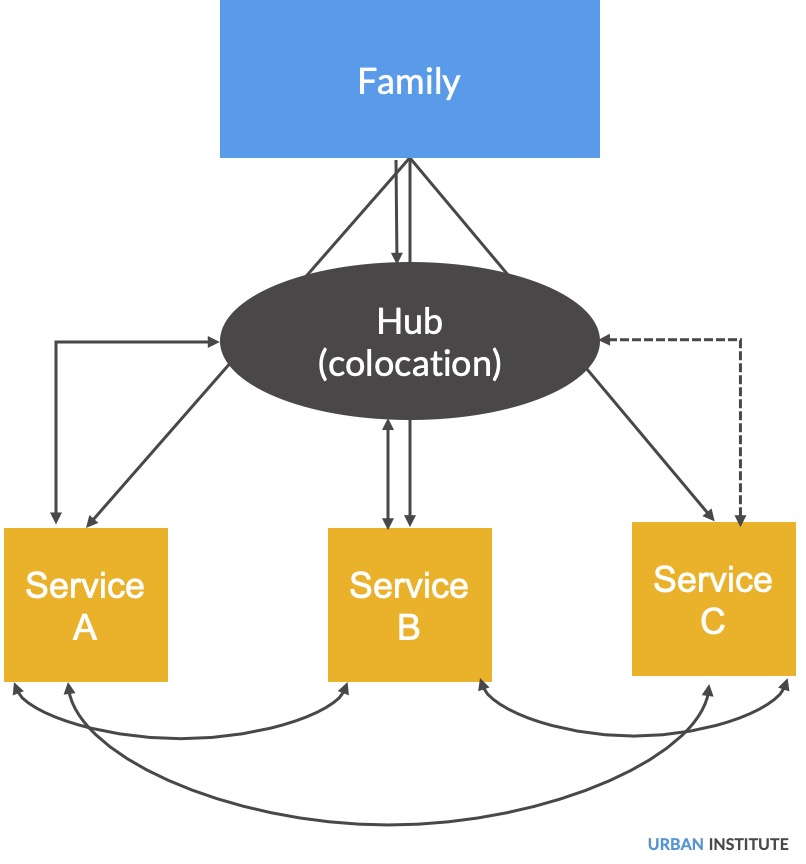
When Mia moved to western Massachusetts with her infant and preschooler, she had no idea how to begin to build her community. Mia needed to find connections to other families, early education and care services, and other resources in the community. Fortunately, she walked into her local library. There, Mia met a person who connected her with play groups, led story time for families with young children, and offered information about the free public preschool. (We’ve changed Mia’s name to protect her privacy.)
After getting to know Mia’s children, the person (who Mia thought was a librarian, but was actually an early childhood coordinator supported by a grant-funded program) also gently suggested that Mia’s preschooler might benefit from early language intervention and guided Mia on how to get those services. Prior to meeting the coordinator, Mia had no idea her daughter had a language delay because her family’s isolation meant she couldn’t compare her daughter to other children.
Because of Mia’s decision to head to her local library, she was able to get the support that she and her children needed. Now, Mia has the information she was seeking to learn parenting tips, establish relationships with other families, and connect with existing early childhood programs within her community.
In contrast, many families of the more than 340,000 children under age 5 across Massachusetts lack access to information about the services they need. Although the state has more than 50 initiatives designed to connect these families to information and services, the current situation is a patchwork—supporting only some families, depending in part on where they live. In a recent study working with Massachusetts families like Mia’s, an Urban Institute research team identified challenges resulting from this patchwork.
Massachusetts’ patchwork early childhood system leaves some families behind
We found that initiatives to coordinate early childhood services in Massachusetts are funded at insufficient levels to reach all families and do not exist in all parts of the state. This non-system translates into inequitable access for Massachusetts families, especially those who are furthest from opportunity.
Consistent with our findings, other existing research suggests fragmentation within and across early childhood services. Ideally, the early childhood system would offer families access to “early childhood infrastructure,” including health and well-being services, early education and care, connections to other families, and community resources.
Currently, the state provides some funding to support the salaries of people who can connect families to services through the Coordinated Family and Community Engagement (CFCE) Network. The coordinator who helped Mia, for instance, wasn’t a librarian but was a parenting specialist funded by a CFCE Network grant.
Through tax dollars, the state funds 80 CFCE grants to local organizations to provide child development services and resources to families with young children. The structure of these connections to services varies, but many family members who participated in Urban focus groups told us they benefited from what they perceive as informal connections to other families and community services. Only a few knew the acronym “CFCE,” but many, including Mia, told us that they happened upon “free” services by chance.
Similarly, the early speech services Mia accessed are funded through Early Intervention, a targeted set of services for young children with demonstrated delays. And the “free” preschool Mia accessed is another example of a taxpayer supported effort. The Commonwealth Preschool Partnership Initiative (CPPI) gives grants to cities, towns, regional school districts, or educational collaboratives that expand high-quality pre-kindergarten or preschool opportunities—on a voluntary basis—to four-year-old children.
Creating a connected system of early childhood infrastructure
More than 50 separate and fragmented initiatives currently exist, but a system is needed to coordinate these disparate supports. Mia was fortunate that she happened to access good information that connected her to services, but many of the families in the Urban study were not. Those families told us that the ideal system would be easily accessible through existing service providers and would be easily identifiable in a local building or hub.
Ideally, Massachusetts families could access connections to services either through a “hub” with co-located services, or by being referred to services through existing providers, called a “no wrong door” approach. The figure below shows an ideal system that includes both a hub and a no-wrong-door approach.

Families expressed that policymakers should engage families in the design of the local systems to ensure that regardless of language, race, ethnicity, or citizenship status, families could access information about services. Study participants also told us that creating and implementing an equitable early childhood system requires sustained public funding and continued philanthropic support to scale up innovations. One study participant said that “legislation and funding to fully support early childhood services and infrastructure is the social justice issue of our time. We are talking about a major systems-change effort that requires a substantial commitment.”
From our study, we developed recommendations that point to a larger state role, greater coordination at the state and local levels, and a focus on tailoring the system to meet unique local contexts and the needs of families. As policymakers review Governor Healey’s recently proposed $114 million in new funding for early education and child care and her Task Force on Ensuring Affordable, High-Quality Child Care (PDF) reviews the state’s child care systems, they should consider creating efficiencies, reducing duplication, and prioritizing community design so the system can best meet the needs of families within their local communities.
By creating a more robust system of tailored early child services that are readily accessible (at, say, pediatricians’ offices or through community-based organizations that offer co-located services), Massachusetts policymakers can ensure that all families can access the services they need to best support their young children.
Tune in and subscribe today.
The Urban Institute podcast, Evidence in Action, inspires changemakers to lead with evidence and act with equity. Cohosted by Urban President Sarah Rosen Wartell and Executive Vice President Kimberlyn Leary, every episode features in-depth discussions with experts and leaders on topics ranging from how to advance equity, to designing innovative solutions that achieve community impact, to what it means to practice evidence-based leadership.